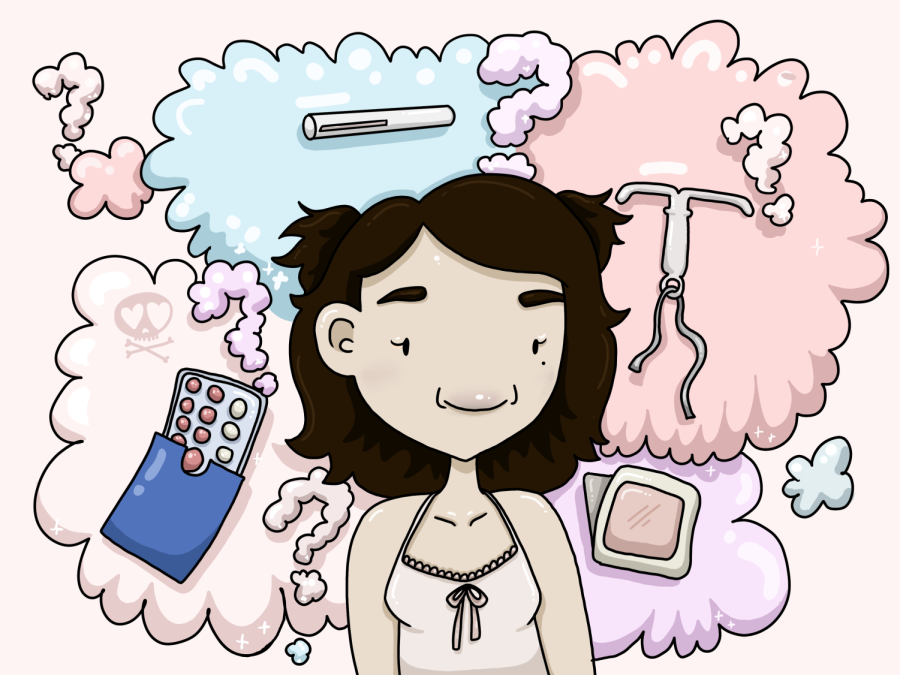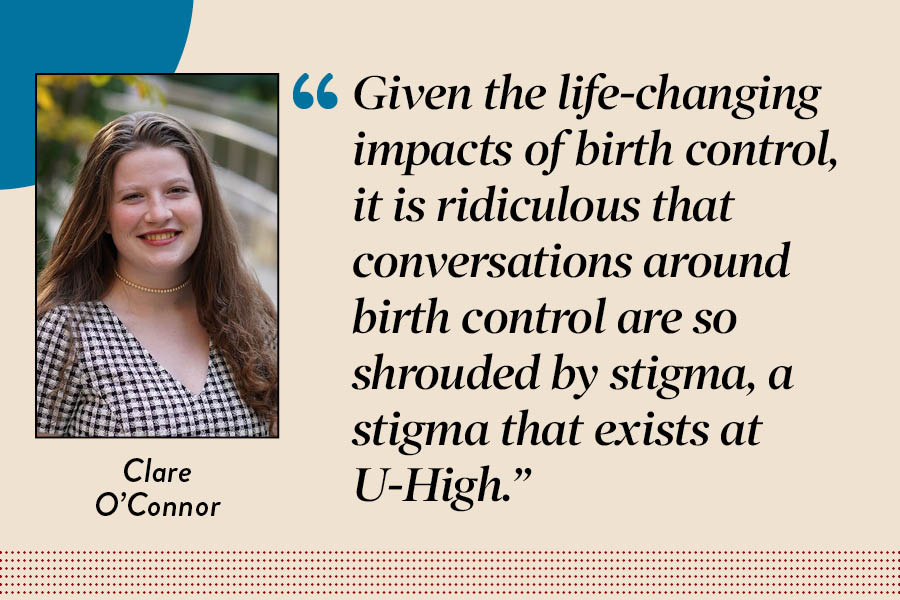Despite common belief, students and medical professionals say birth control does more than prevent pregnancy.
Birth control: More than pills, periods and pregnancy prevention
February 14, 2023
Birth control is a medication or procedure that many people use for varying reasons. It can be used to prevent pregnancy, control hormones and deal with other medical problems.
Hormonal medications can provide way to manage menstrual cycle
Just days ago, sophomore Uma Malani left school early to spend an hour in the doctor’s office, surrounded by needles and nurses, waiting to receive answers about her menstrual cycle. Since she got her first period in late seventh grade, Uma has suffered from frequent periods of intense, intolerable pain for weeks at a time.
When on the birth control pill, Uma’s periods did not improve as she expected, and she still experienced many symptoms she sought to relieve.
“When going to the doctor, I was looking for a better alternative to what was happening and, really, I wanted to know if there was something wrong with me,” Uma said.
Now, she is looking for a medication option, other than the birth control pill, to manage her menstrual cycle that works for her.
Hormonal medications, including the common hormonal birth control, have the potential to provide a solution for adolescents looking to manage menstruation and menstrual-related symptoms. While these medications have been widely studied and tested, each user has a unique experience.
Shashwati Pradhan, Assistant professor of obstetrics and gynecology at the University of Chicago, often sees patients like Uma who wish to address their periods. She said many patients note painful periods with intense cramping, excessive bleeding and a duration that exceeds the typical three- to seven-day window. For patients wishing to address their cycles, for menstrual suppression or control, Dr. Pradhan and Dr. Chor both like to present a variety of options.
“There are incredibly safe and effective medications, though each one is not for everyone. People have their different kind of preferences or factors that are important to them when choosing a method, and so the most important thing is understanding what’s most important for them in terms of thinking about picking a medication to help,” said Julie Chor, a Lab parent and associate professor of obstetrics and gynecology at the University of Chicago.
Dr. Pradhan noted that while medications to manage periods are often only referred to as “birth control,” not all medications have contraceptive efficacy.
“The term ‘birth control’ can sometimes intimidate people. Especially because a lot of my patients are younger, they come with parents and guardians who sometimes also feel like their child is too young to be on something like that,” Dr. Pradhan said. “But in terms of menstrual management, there are some hormonal medications that are not contraceptive, which makes the way we phrase it an important distinction to make.”
When seeing patients looking to manage their periods with medical steps, Dr. Pradhan categorizes the many medication options in two primary ways: combined and progesterone only.
Combined medications consist of two primary hormones — progesterone and estrogen — and often allow the user to experience a bleeding episode approximately every 28 days that tends to be more manageable for patients, often resulting in more regular periods with lighter bleeding and cramping. According to the American College of Obstetrics and Gynecology, combined medications also have the potential to manage acne, reduce the occurrence of menstrual-related migraines without an aura and decrease the risk of ovarian, uterine and colon cancer. Combined medications include the patch, ring and widely known birth control pills, and each method has a unique potential for side effects.
With birth control pills, Dr. Chor and Dr. Pradhan both noted that adolescent patients frequently expressed concerns about side effects such as weight gain, even though medical studies show evidence of little to no correlation between hormonal birth control and weight gain. Dr. Chor believes the internet often contributes to this since teens have access to a wide range of sources.
“If you start Googling any information on contraception, there’s a lot of really high-quality information, but there’s also a lot of misconceptions too,” Dr. Chor said. “You want to validate each person’s experience, but that doesn’t mean that everyone will experience weight gain on birth control pills.”
The other main category for menstrual management consists of progestin-only medications, which contain a form of progesterone, a hormone involved in pregnancy and menstruation. These medications consist of pills, which, unlike the combined pill, may stop a patient’s period entirely or thin the uterine lining enough to largely reduce bleeding. Another form includes the birth control injection or an IUD, an intrauterine device.
With both types of medication, Dr. Chor and Dr. Pradhan both consider the patient’s medical history when selecting a medication to address other medical conditions as well as certain menstrual disorders such as endometriosis.
Each person’s experience can differ based on individual preferences to individual side effects. For people like Uma, whose first experience with the pill was not what she expected, she now hopes trying other methods to address her periods will allow her to live her life cramp-free, as she hasn’t been able to do in years.
“One of the biggest questions that I ask my patients is how are the menstrual symptoms impacting your life? If you’re having a ton of pain, you’re missing school, you can’t make it to volleyball practice because the pain and bleeding is just too much, there are options for you.” Dr. Pradhan said. “My goal is always to help patients reclaim their time so they can get back to the things that they really want to do.”
Birth control as medication must be discussed more openly
Midway Staff
Editor-in-Chief Clare O’Connor says that despite its medical benefits, birth control isn’t perceived as medicine.
I’ve struggled with chronic pain my whole life. Fortunately, I’ve had access to medications and procedures to address my pain. Fluctuating hormone levels exacerbated my pain every month. It was horrible. I just lived with that for a while.
After a lot of frustration and appointments, I started taking hormonal birth control pills when I was 15. Birth control became just another part of my treatment. Immediately, my health improved. While the pill helped, it wasn’t the perfect option for me, so at 17, I went off the pill and got a Mirena IUD that has truly changed my life.
Birth control is medicine: It can prevent cramps, migraines, acne, anxiety, depression, pregnancy and countless other medical concerns. The problem is that birth control isn’t perceived as regular medication. Instead, birth control options are stigmatized, misrepresented and restricted.
Young people are often told that menstrual pain is just something they have to learn to manage, that side effects should be expected, and that talking about birth control should make them uncomfortable. However, this just isn’t true: periods don’t have to be debilitating. In fact, many people can safely stop their periods altogether; if a certain method of birth control causes disruptive side effects, doctors can and should work with patients to find an option that meets all of their needs. Talking openly about birth control is the only way to make sure these basic facts are known. Needless taboos are putting people in avoidable pain.
According to the American College of Obstetricians and Gynecologists, approximately 1 in 10 females between the ages of 14 and 20 miss school or work every month because of debilitating menstrual symptoms, and many more show significantly reduced engagement with their responsibilities. However, this prevalent struggle is often not addressed. Many people feel uncomfortable discussing their pain and never get treatment or even realize their pain is abnormal. When people do speak up, their concerns are frequently dismissed by doctors.
Along with the baseline medical benefits of birth control, birth control is also crucially one of the most effective ways to prevent pregnancy. Awareness about different birth control options and their benefits has proven to drastically reduce the chances of unwanted pregnancies, especially for adolescents. The medical consequences of pregnancy can be severe, long-lasting and in some cases fatal, not to mention the impact of actually having and needing to support a child.
Given the life-changing impacts of birth control, it is ridiculous that conversations around birth control are so shrouded by stigma, a stigma that exists at U-High. Because we avoid talking about birth control, people suffer with unnecessary pain. So share your personal stories. Ask your doctors and friends questions.
Glossary
Birth Control Pill: 93% effective
Birth control pills are pills taken daily that release the pregnancy-preventing hormones estrogen, progestin, or both. These hormones prevent ovulation, meaning there is no egg for sperm to fertilize.
Cost
The pills will need to be prescribed by a health care provider with doses being covered by most insurance, but some insurance plans may only cover certain brands or types of pills.
Side Effects
The side effects may include light bleeding, bloating, weight gain and higher blood pressure.
Birth control pills do not prevent diseases transmitted through sex.
Birth Control Implant: 99% effective
The birth control implant, also known as Nexplanon, is a thin rod inserted into the arm by a medical professional. The implant will release the progestin hormone that prevents pregnancy by thickening mucus around the cervix, preventing sperm from getting in.
Side Effects
Side effects may include headaches, weight gain, ovarian cysts, nausea and breast pain, but these might be different for everyone.
Cost
The implant is covered by most insurance plans and Medicaid, but without insurance the implant could cost more than $1,000.
IUD: 99% effective
An intrauterine device is a T-shaped piece of plastic that is inserted into the uterus by a health care provider. There are two types of IUDs, hormonal and copper. Hormonal IUDs release the progestin hormone that prevents pregnancy, while copper IUDs are wrapped in a thin copper wire which creates an inflammatory reaction that is toxic to sperm and eggs.
Side Effects
The side effects for a hormonal IUD may include cramping a few days after it is put in, spotting or light bleeding, and irregular periods. The side effects for a copper IUD are heavier cramps and bleeding during periods.
Cost
An IUD is covered by most insurance plans and Medicaid but without insurance could range between $500 and $1,300.
Birth Control Patch: 93% effective
The birth control patch is a small, almost sticker-like, patch that you place on the upper arm, back or stomach that a person replaces once a week. The patch releases estrogen and progestin that prevent ovulation, which prevents the sperm from meeting the egg.
Cost
A prescription is needed to get the patch, and prices vary on insurance. One pack comes with three patches that lasts for around a month. One pack can be covered by insurance but without insurance it will cost around $150.
Side Effects
The side effects can include headaches, light bleeding and skin irritations where the patch is placed.

